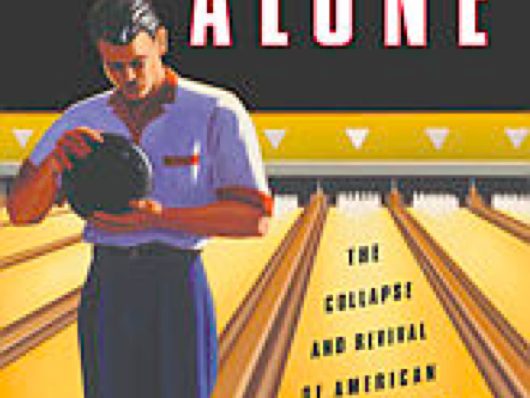Escalante
Image source: cover of Bowling Along, Robert Putnam.
This is ironic because what Brand was living through was decades of collapse of social capital.
This is the science bit. We can test the power of your social network: social capital is an abstract measure that wraps up how many people you know, the information flow in your network, how many people owe you favours, that kind of thing.
Very literally, high social capital goes hand in hand with being in groups, and with knowing your neighbours. People with high social capital have better jobs, live longer, and are healthier and happier. In areas with high social capital, there’s less litter, and car drivers behave better at road junctions. It’s big things and little things.
It’s a big deal. If you aren’t in any groups, and you join just one, your odds of dying next year are cut in half. if you’re a smoker and aren’t in any groups, statistically it’s about the same whether you should join a group or quit smoking. (Source.)
Health, wealth and happiness.
What damages social capital, at least that we know of, at least in the US, is two things: commuting, and television. Both stop you spending time with your friends and neighbours.
It’s nuts. So while Levittown and suburbia in general was spreading across the USA, with increased commuting times and TV dinners, social capital dropped drastically between 1975 and the end of the century. In that time, the average number of times Americans had friends over for dinner in a year dropped from 15 to half that.
I suspect, if we had ways to see it, way of visualising it like the kids in the Child Garden seeing ecology, the 1980s would be a Great Depression of the social world.
And Stewart Brand and the rest were coming back against this! I’m sure the Web comes back against this. I know loads of people I wouldn’t know except for the Web. The fact that our hobbies are social again is great. Flickr builds social capital; Twitter builds social capital. The fact that are hobbies are social again is not about fun, it’s not just for our happiness, it’s not about making them viral: it’s important.
So we here are involved in a project born in the 1970s, a fightback against declining social capital. And of the other grand project, Doug Engelbart’s project of augmenting human intellect to let us be passionate and creative? He didn’t do badly either. I’m able to indulge my creativity with powers my parents and grandparents would be amazed at.
We’re living in the fulfilment of the dreams of the visionaries of the 1950s.
